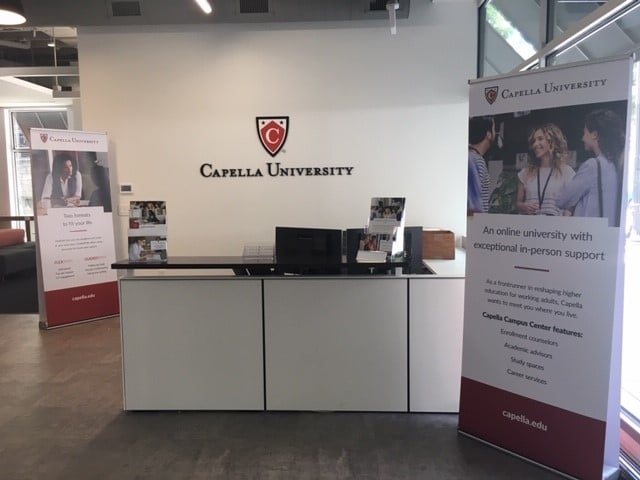You have /5 articles left.
Sign up for a free account or log in.

Capella University
Capella University has a history of doing things a little differently. Founded 26 years ago as a graduate university aimed at working adults, it was one of the first online-only institutions. Five years ago, it was an early mover into competency-based learning, with its FlexPath program.
"We're constantly trying to find ways to help learners fit their education into their lives," said Richard Senese, Capella's president. "We're always looking to keep innovating."
Capella is going old-school for its newest metamorphosis -- into a physical building.
The for-profit institution, which merged last year with Strayer University to create Strategic Education, is opening its first "campus center" on a busy intersection in downtown Atlanta, with a second to follow soon in Orlando, Fla.
The physical locations will not offer instruction, but Capella students and alumni near Atlanta (and eventually Orlando) will be able to work at the centers, consult with academic advisers and meet with peers. The Atlanta center will be open into the early evening and, at the start, every other Saturday.
Senese said the creation of the campus was less a departure from Capella's wholesale embrace of online education and more a recognition of "the increased complexity about online learners’ lives … Many learners are looking for multimodal ways of connecting with their universities."
A recent survey of online college students by Wiley Education's Learning House and Aslanian Research found that two-thirds of such students say they live within 50 miles of a campus or service center of the college where they are studying, up from 42 percent just five years ago.
The study's authors attributed the increase mostly to the growth in the number of colleges and universities offering online programs, which gives students more local educational options with which they might be more familiar.
But Capella is not the only institution with a national online footprint that is trying to layer on a local approach.
Georgia Institute of Technology last year said it planned to create a series of "storefronts" to serve as a physical “touch point” for thousands of students already studying online through the university.
Northeastern University has used the regional campuses it began creating nearly a decade ago in part to strengthen its connection to its online students in different parts of the country.
The University of Phoenix, which killed off many of its campus locations earlier this decade amid shrinking enrollments, plans a series of new microcampuses, The Chronicle of Higher Education reported this month.
Those institutions have many years of campus-based learning to build on. Capella officials acknowledge that this experiment with an on-ground facility for students will require them to try new things, too.
"We have all kinds of ideas about what we might do to help learners improve their success both with their programs and in their transition into their profession," Senese said.
"But we'll have to see what works. This is an opportunity for us to learn with our learners."









